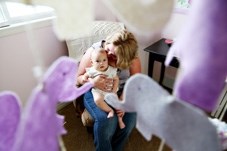Breastfeeding is by no means a new concept, but the World Health Organization is trying to bring awareness of its importance not just to moms, but to the public as well.
World Breastfeeding Week is recognized in more than 170 countries on Aug. 1-7 as to help encourage breastfeeding and promote the benefits to mom and baby.
Okotoks doula Angie Kwade teaches breastfeeding classes through the Complete Health Chiropractor and Family Wellness Centre, and said that it’s important to help moms through the process both emotionally and physically.
“It's a natural thing, but it doesn't come naturally,” Kwade said. “It takes work, it takes patience.”
As a mother of three, Kwade has plenty of firsthand experience. Breastfeeding was challenging with her first child, but with her second she used a lactation consultant and felt there was a real need for the coaching services that helped her so much. She took a breastfeeding education course that is typically for nurses and began offering support to local women in the area.
“I try to provide them with resources, I always make them aware to call me any time if there's any questions, because a lot of times it's at three in the morning, early post partum baby doesn’t stop feeding and you just need someone to say to you, 'it's normal, sit back and relax,” she said. “That's the gist of the class, show them what their days are going to look like, how their milk is going to change, and what you can expect.”
Kwade helps coach moms through the physical challenges, but she said a big part of it is emotional support too as new moms often aren’t prepared and assume it’s something that will just come naturally.
“We spend more time shopping for our crib than we do preparing ourselves for (labour and breastfeeding),” she said. “Women may be going through it and have friends who aren't so they don't know where to go. I think just knowing that there's some local support makes a big difference.”
Kwade encourages moms to breastfeed, but said it isn’t about shaming mothers who don’t as she believes there is a different balance between breastfeeding and formula that works for everyone.
“It's very confusing and I think new moms carry a lot of guilt because maybe you had a really rough day and for whatever reason you gave baby a bit of formula, well god forbid anyone finds out,” Kwade said. “No mentally healthy mom is out to hurt their child, and if they decide this is the way they're going to do it, that's their decision and it's no one else’s business.”
While promoting the health benefits for babies used to be the biggest goal of the breastfeeding awareness week, in recent years it has shifted to focusing on increasing public acceptance of breastfeeding to help encourage women to do so.
Kwade used to volunteer with the Alberta Breastfeeding Committee, which is a group of health care providers and breastfeeding experts whose vision is to make breastfeeding the norm in Alberta.
Kwade said moms can turn to the organization for assistance if they feel they have been treated unfairly in public.
“If something should happen to you when you're breastfeeding you can go to them, like if a store asks you to leave, you go to them and they do the nitty gritty work and write letters,” she said.
The committee includes Alberta statistics on its website that show low numbers of women in the province who choose to breastfeed.
Nearly 91 per cent of new moms in Alberta were breastfeeding in 2009-‘10, but that number drops to 29 per cent by the time the baby is six months old.
Kwade said she feels that if it were more acceptable to breastfeed in public, women would feel more confident and it could help boost those numbers.
“Some women I’ve met in the circles are very pro you should not have to cover up,” she said. “My view is you do whatever is most comfortable for you. I cover-up because I’m more comfortable that way, that’s my personal opinion, but I think you see more (nudity) at the rec centre in the pool than you do on a nursing mom. “My belief is what works for you works for you, just know that you have support out thereIt there a website, or contact for more information? Say, for the Alberta Breastfeeding Committee? .”




